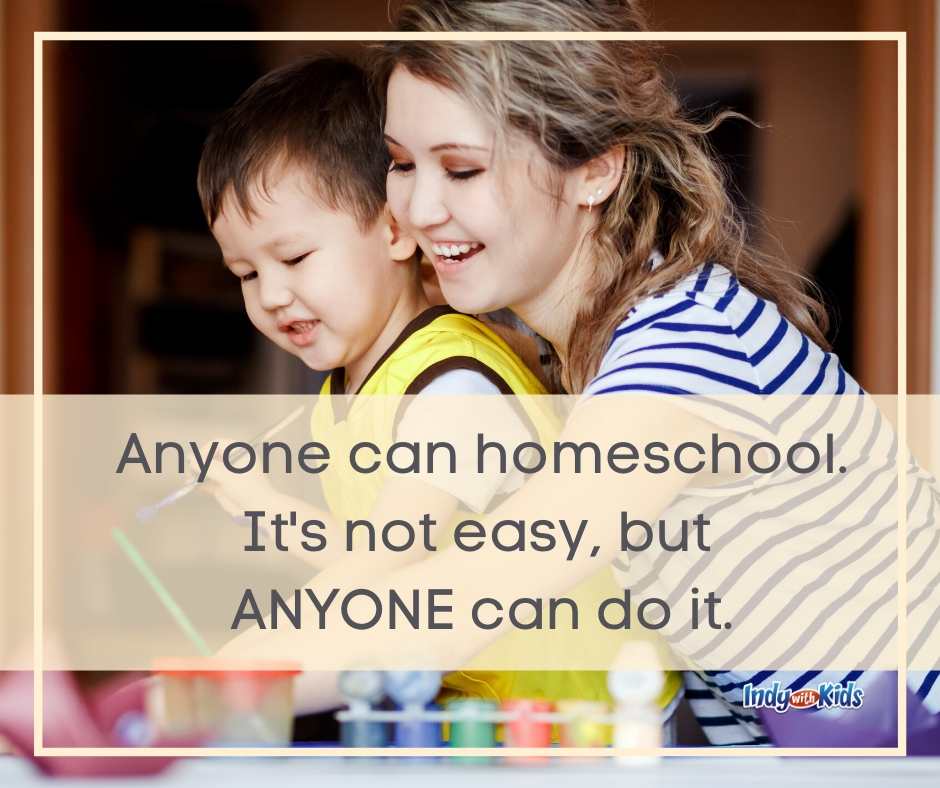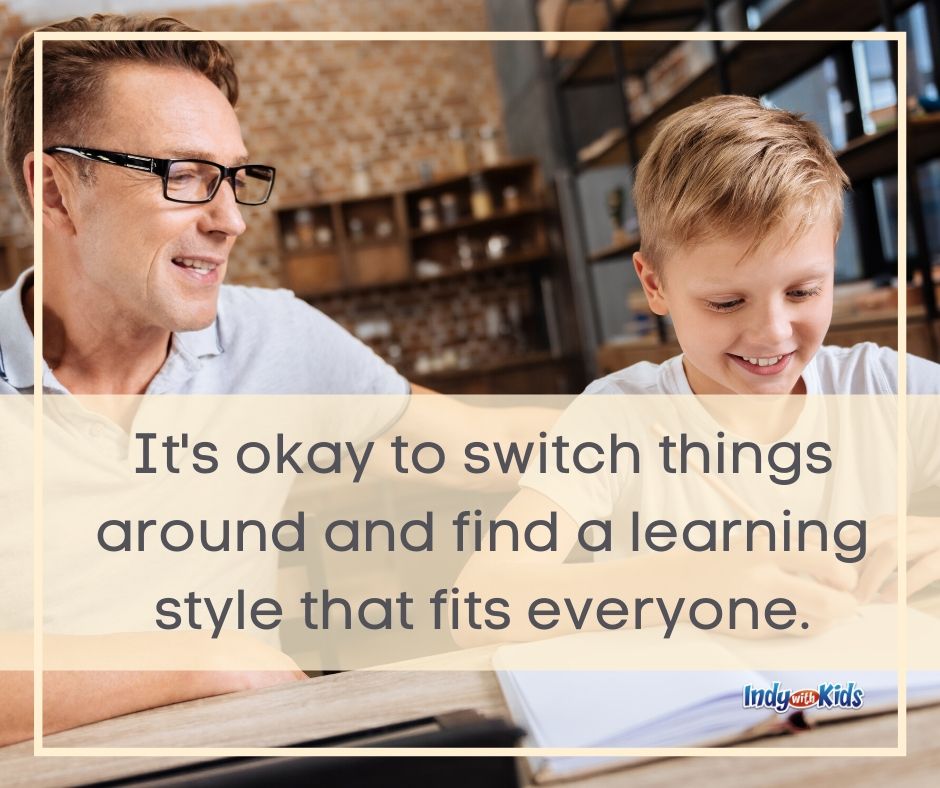So, you’re interested in homeschooling? If you aren’t, likely you know someone who is. It seems my newsfeed is full of parents seeking out alternate schooling options as we approach the traditional “back-to-school” time. I’ve homeschooled for almost six years, and every year, 2-3 traditional school friends will inquire about our journey. This year, though, it feels as though everyone is wondering.
Homeschooling is, genuinely, one of the greatest adventures I have been lucky enough to take on in my life. It is also hard (sometimes, really hard), time-consuming, incredible, fun, and has allotted my children opportunities they would never have had in a traditional school setting. Bonus, Indiana already has a well-established homeschool network of individuals—who are also flooding my newsfeed, with open arms, offering to help and answer questions for anyone who may be interested.
Before I get started explaining the homeschool journey, I feel like you should know who is talking to you about it. I am in the unique position of being pro-school and pro-homeschool. Even though I have homeschooled for the last six years, I’m also going into my third year as a public-school STEM educator. I have one foot in both worlds at all times, and I see the struggle that goes into making the choice either way.
Should I Homeschool?
If homeschool is a path you are interested in exploring, let me start off by saying: anyone can homeschool. It’s not easy, but ANYONE can do it.
The biggest response I got to homeschooling before the pandemic was: “Oh, I could never do that. I’m not ____ enough.” Whether the fill-in-the-blank word was qualified, disciplined, organized, or patient, everyone has been shown they CAN teach their own children.
Safety is at the forefront of consideration right now for many of those thinking about homeschooling. There are many other factors that go into the choice of homeschooling, too. The constraints of time, finances, and feasibility are all major factors.
When I started homeschooling, I was a single parent household, working multiple jobs, with a first grader and an infant. It was never EASY, but it was possible. I know several households who have one parent stay home full-time or works part-time, or both parents work full-time on opposite schedules. None of these options may work for you. I worked a lot of nights, weekends, and work-from-home options to make things work when we were first starting out. The biggest tools you need to homeschool are dedication to your child’s education and a commitment to teaching the way they learn, which may be very different from what makes sense to you.
What Are the Options?
Homeschooling is very different from “school at home” or “e-learning”, the latter being offered by many school districts right now. There are free online public schools offered in Indiana, k12 and Connections Academy. These are options to consider if you are planning to make this a short-term commitment and intend to return to public school in the near future, or if you want minimal prep planning out curriculum and a schedule. While technically “schooling from home” these are legally considered public schools and not homeschooling.
Homeschool Requirements in Indiana
The requirement to homeschool in Indiana is 180 days of instruction from July 1 to the following June 30. You must keep a record of attendance. You can use anything to do this, from a notebook to the calendar on your phone. There is no specified amount of time that constitutes a school day, and no starting or ending times.
A day homeschooling looks different for every family, some following very structured formats and others more child-led learning. Some families do core subjects every day, while others alternate subject days, or do something altogether different. World Book has a list of typical courses of study for every age, if you need inspiration on subject matters.
If your child was previously enrolled in school, you will need to withdraw them from school by submitting a letter of intent to homeschool to their school, so they aren’t counted as truant when the school year starts. (If you need help with this, Indiana Association of Home Educators currently offers an option to fill-in your personal information, and they will email you a personalized letter you can pass onto your school district.)
You’ve Decided to Homeschool, Now What?
Once you have decided to homeschool, there are many questions to ask yourself.
- How will your homeschool environment look?
- Are you trying to recreate a traditional school model in your home, or a more informal and relaxed setting?
- What is your approach to homeschooling?
There is no cookie-cutter homeschooling guide, with approaches including Classical, Unschooling, Charlotte Mason, Montessori, Unit Studies, and eclectic approaches that may draw from a variety of sources.
Does your idea of homeschooling draw from a religious aspect, or is it secular? There are curriculums and communities for both, don’t worry.
What is your method of instruction, and how much you can afford for that instruction? If your budget is non-existent, there are still options. There are Facebook groups dedicated to homeschooling for free, tons of free apps and websites, prepared curriculum, such as Easy Peasy (not secular), and don’t forget about your local library.
If you have a bit of a budget, there are often online and in-person book fairs and curriculum swaps you can participate in throughout the state. Indiana and the Mid-West offer annual homeschool conventions, where you can check out different curriculums and texts before committing to one. As a home educator, you have the option to piece together a curriculum, pulling from different sources, or you can purchase a curriculum that is ready to go from the box, complete with teacher manuals and all.
Let me just say it: You will likely (and excitedly) choose something along the way, whether it is your approach or curriculum, that your child doesn’t enjoy or doesn’t work with their learning style. It’s okay to switch things around and find a learning style that fits everyone. While it can be disappointing and frustrating when this happens, it is also a huge benefit of homeschooling. You get to see what works in the best way for your child to learn. (Also, even if your budget is next to non-existent for homeschooling, you may want to pad your monthly grocery budget. Second breakfast is a real thing, folks.)
Sports and Activities
Sports/ clubs can be more expensive, since they are not provided through a school. There are opportunities through libraries and scouting groups that are free or more cost effective, but sports seem to be a big cost. Also, if opportunities for competition are important, this may take some additional researching for your area. Another thing to consider may be the travel time to get to a location where these types of events are offered and how regularly you would want to attend them.
Benefits of Homeschooling
I could fill an entire article with the benefits of homeschooling to me, but I will just list a few here. I am thankful for the time with my children, a flexible schedule and the fact that you can homeschool literally anywhere. We’re able to tailor their learning to their interests and also accelerate or decelerate subjects as fits their learning style, and my kids get the real-world, hands-on learning experiences the homeschool lifestyle provides.
Find Support Within the Community
The most sanity saving piece of advice I can offer to anyone looking to homeschool, is to find a community and a support system. Some of us are lucky, and get tons of support from family and friends. Others will constantly get push-back from the people around you. No matter how much support you have, a stranger at the grocery store, upon finding out you homeschool, will undoubtedly quiz your child on things they feel like your child should know. Don’t take this to heart, but do find a group that understands what you are going through. There are Facebook groups and co-ops that can be very helpful. You have to put in the work and seek out experiences, but there are a ton of opportunities for socialization, group outings, and field trips.
Have there been days I have cried, questioned myself, thrown in the towel, and eaten all the chocolate?
Absolutely. It happens. Does that change my mind that this path is what is best for my child? Not in the slightest. In the end, it comes down to doing what is best for you, your kids, and your situation.








1 thought on “Should I Homeschool? | What You Need to Know About Homeschooling”
We were able to homeschool all of our children through high school. I would do it again! 🙂 This article is very helpful and how things worked for us.